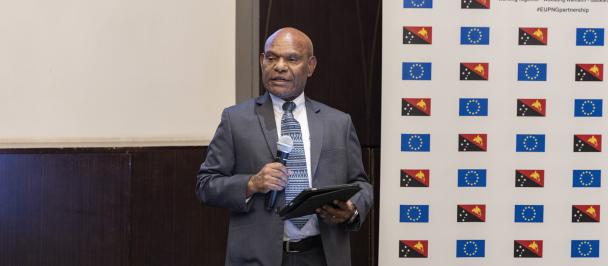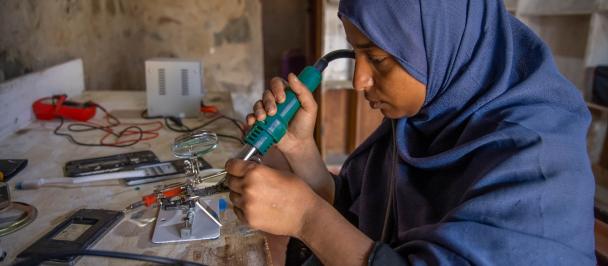By Dr. Aretha Aprilia – Head of Environment Unit, UNDP Indonesia
Empowering Youth: Transforming Passion into Action for Energy Transition
June 22, 2023

Ilustration photo of youth and energy
The energy landscape of Indonesia stands at a critical juncture, with a growing reliance on fossil fuels but promising potential in renewable energy. The nation has set ambitious targets, aiming for renewable energy to comprise 23% of the energy mix by 2025. This presents a critical opportunity for the youth to actively contribute to the energy transition and help Indonesia achieve its renewable energy goals.
In a recent panel discussion on "Youth for Energy," hosted by the European Union and Embassy of Sweden in Jakarta, UNDP Indonesia highlighted the significant role of young individuals in Indonesia's energy transition journey. From education and knowledge building to operationalizing smart grids and engaging with environmentally conscious institutions, the youth have the power to turn their passion into action. By actively contributing to the energy transition, they can shape a sustainable and prosperous future for Indonesia, leaving a lasting positive impact for generations to come. UNDP Indonesia stands ready to support and empower the youth in achieving their renewable energy goals.
In this blog post, I would like to share some key insights from the panel discussion where it became evident that the youth have a strong understanding of the essence and significance of the energy transition. However, the youth expressed concerns about how they can make tangible contributions. In response, we emphasized three primary avenues through which youth can contribute to the energy transition.
Education and Knowledge Building/ Sharing: Prioritizing education and capacity building is essential for equipping young individuals with the necessary tools to drive sustainable change. Skill development and training play a crucial role in enabling youth to actively participate in the implementation and maintenance of renewable energy projects. As technology rapidly advances, new frontiers of knowledge are being unlocked. Concepts like artificial intelligence (AI), big data, and machine learning have gained traction in recent years, offering opportunities to optimize energy systems and for relevant stakeholders to make informed decisions. By acquiring relevant skills in fields like data analytics, AI development, and energy management, young individuals can contribute to the exciting frontier of energy transition.
The youth can play a significant role in areas where implementation concepts are still being developed, such as the operationalization of smart grids and the ASEAN Power Grid (APG). The
APG, led by the ASEAN, aims to establish an interconnected power grid across the region, facilitating electricity sharing, enhancing energy security, and enabling the integration of renewable energy sources on a larger scale. However, outdated grid infrastructure and technological limitations pose challenges to this initiative. The youth, with their fresh perspectives and adaptability to new technologies, can actively participate in the energy sector by focusing on education, skill development, and knowledge sharing. Their contribution may eventually help drive the modernization of power grids and pave the way for efficient transmission of electricity across borders.Engagement with Environmentally Conscious Corporations and Institutions: Many corporations and institutions recognize the importance of environmental sustainability and social responsibility. By joining such organizations, young individuals can pursue fulfilling careers that align with their values and contribute to the energy transition. Some companies have established "shadow boards" comprising young individuals who provide fresh insights and innovative ideas. These boards actively participate in shaping sustainable business practices, implementing renewable energy solutions, and driving innovation in the industry. Engaging with these institutions provides excellent opportunities for youth to make a significant impact.
Additionally, the youth can contribute to the energy transition by raising awareness among their peers about the importance of sustainable energy practices. By sharing knowledge, inspiring others, and promoting innovative solutions, they can create a ripple effect of positive change. Young entrepreneurs and sociopreneurs in Indonesia, leveraging technology and digital platforms, are already making significant contributions by creating innovative solutions and services that drive economic growth and create job opportunities.
Furthermore, incorporating renewable energy and energy efficiency measures into daily lives is another impactful way for the youth to contribute. By installing solar rooftops, adopting energy-efficient practices, and embracing alternative modes of transportation, they can reduce their carbon footprint and inspire others to follow suit.
UNDP's Efforts to "Walk the Talk"
UNDP recognizes the significant role that youth participation plays in driving energy transition and the importance of engaging young people as catalysts for change in decision-making processes and energy transition strategies. According to a recent UNDP Indonesia survey, more than 80% of Indonesian youth are concerned about climate change and expressed a strong desire for early training on Just Energy Transition, recognizing its importance. To address these aspirations, UNDP actively participates in the Just Energy Transition Partnership (JETP) Secretariat and leads the Just Transition Working Group, aiming to create equitable opportunities ─ including for Indonesian youth.
UNDP's commitment to youth engagement is exemplified through hands-on and downstream projects like the Korean KOICA-funded 'ACCESS' project, which selected and trained young individuals from local communities as certified operators for solar PV power plants. Half of these operators were under 25 years old, and the other half were women, showcasing UNDP's dedication to inclusivity and gender equality. The project also organized a Business Plan Competition in Renewable Energy, encouraging university students to present ideas for village-level businesses enabled by project-provided electricity access. These proposals were then shared with village-owned enterprises (BUMDES) and the Ministry of Village to implement at the grassroots level, fostering entrepreneurship and innovation in renewable energy.
Final Takeaways
In conclusion, the active participation of youth is crucial for the successful energy transition in Indonesia. The emergence of new knowledge and technological breakthroughs has created unprecedented work opportunities, particularly in the realm of renewable energy and sustainable practices. As we navigate this transition, it is imperative to ensure that no one is left behind.
By embracing these opportunities and fostering a culture of innovation, we can unlock the full potential of technology in driving a sustainable and prosperous future. It is through the collective efforts of all stakeholders, including the youth, that we can accelerate the energy transition and ensure affordable and sustainable energy for all. UNDP remains committed to working alongside Indonesian youth, supporting their aspirations, and empowering them to shape a brighter and greener future for the country.
UNDP Indonesia | Menara Thamrin, 7 - 9th fl., Jl. M.H. Thamrin Kav. 3, Jakarta, Indonesia
Tel: +62 21 2980 2300 | E-mail: registry.id@undp.org | https://www.id.undp.org/

 Locations
Locations
